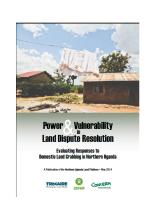Land Library
Welcome to the Land Portal Library. Explore our vast collection of open-access resources (over 74,000) including reports, journal articles, research papers, peer-reviewed publications, legal documents, videos and much more.
/ library resources
Showing items 28 through 36 of 63.Well before the effective ending of the protracted Lord’s Resistance Army (LRA)
insurgency in northern Uganda in July 2006, and at a time when the entire rural
population was displaced into camps, concerns had emerged around land, in particular
The constitution and enabling legislation in Uganda, as in many other countries, empower the government to acquire land in the public interest.
The Uganda National Land Policy (NLP) Implementation Action Plan is a deliberate resolution by the Government of Uganda to address major challenges that have hindered the implementation of land reforms, thereby impeding the optimal utilisation of land for socio-economic development and transforma
The Karamoja region in Northeastern Uganda, covering an area of 27,200 square kilometers, is inhabited by around 1.2 million people who live in seven districts; Moroto, Nakapiripirit, Napak, Amudat, Abim, Kotido and Kaabong.
Uganda’s northern region was traditionally inhabited by communities with predominantly pastoral lifestyles. As the country began developing administrative structures in the region, most clans found themselves settled into agro-pastoral communities.
Unfolding analysis reveals two types of land disputes prevalent in postwar northern Uganda: cases that involve a legitimate cause of action and those that do not.1 Since mediation and alternative forms of dispute resolution rely on parties’ willingness to negotiate in good faith, cases featuring
The Uganda Law Reform Commission with support from the Justice Law and Order Sector undertook a study to review the laws of succession in Uganda. The purpose of the study was to ensure among others that; the provisions of the laws of succession are in conformity with the 1995 Constitu
Across the developing world, rural women suffer widespread gender-based discrimination in laws, customs and practices cause severe inequalities in their ability to access, control, own and use land and limit their participation in decision-making at all levels of land governance.
In northern Uganda, common grazing lands are central to village life. While nominally used for grazing livestock, communities also depend on their grazing lands to collect basic household necessities such as fuel, water, food, building materials for their homes, and traditional medicines.







